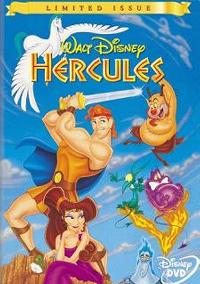Jim Hill: From the Archives
Page 5 of 7

(c) Disney
Part Four: Who the hell do we get to play Hades?
Behind the scenes with Hercules
or:
That's one hell of an inside joke
After putting together two massive money-makers for the Mouse, you'd think that Walt Disney Studios would be feeling pretty grateful toward animation maestros Ron Clements and John Musker, right?
After all, these were the guys who'd delivered the 1988 cartoon hit, The Little Mermaid as well as the 1992 blockbuster, Aladdin. It just made sense that the company would try to show its appreciation toward Ron & John - by maybe allowing them to finally make their dream project - a comic book style space-based update of Robert Lewis Stevenson's pirate adventure, Treasure Island.
Not necessarily.
What was the problem? Then Disney Studio head Jeffrey Katzenberg just didn't see the appeal of Treasure Planet. Space-faring pirates zooming around the universe in big 1950s-style finned rocketships? What audience was this proposed animated film aiming for, anyway? Teenage boys who like old comic books? That audience segment just seemed too small to Katzenberg to count on to turn the film into another animated blockbuster.
What did Jeffrey want? He wanted Musker and Clements to come through with yet another mega-hit for the studio. Another film that would deliver $100 million+ at the box office, plus millions more in merchandise sales. Not some silly little sci-fi spoof that would only appeal to comic book fans.
Jeffrey left Ron and John alone to develop Treasure Planet 'til the Fall of 1993. Then - after officially hearing their pitch for the project - Katzenberg told Musker and Clements that there was no way that he could ever see himself greenlighting this proposed animated film ...
Unless ...
Knowing how desperately Ron & John wanted to make 'Treasure Planet," Katzenberg proposed a deal: He would allow Musker and Clements to produce their sci-fi spoof, but only after they had delivered an earlier animated project for the studio with a much broader audience appeal. (You parents out there reading this might might recognize this maneuver, It's the old "No dessert until you finish your vegetables" ploy. )
Needless to say, after working on Treasure Planet for almost a year, Ron & John were plenty upset that Jeffrey wasn't allowing them to get right to work on their dream project. They recognized that their space pirate story might initially appear to appeal to only a small segment of the potential movie-going audience. But Musker and Clements also argued that - given their track record with Little Mermaid and Aladdin (Where they had taken problematic story material but still delivered movies that had huge appeal to mass audiences) - that they earned the right to try something different.
Katzenberg wouldn't hear of it. He made it clear that this was an "either / or" proposition. Either Ron & John settled for producing a more commercial animated project before getting a shot at making their sci-fi spoof OR Katzenberg promised that - as long as he was head of the studio - Treasure Planet was never going to get made.
Musker and Clements weren't particularly thrilled with this proposition. But they understood that if they agreed to Jeffrey's proposed deal they still might someday get the chance to make their comic book movie. So Ron & John reluctantly put aside their work on Treasure Planet. They then turned to the folks in Disney Feature Animation's development office and asked: "What have you got in the pipeline?"
Plenty of stuff, as it turned out. Among the 30 different story ideas Disney then had in development as potential animated films were adaptations of Jules Verne's Around the World in 80 Days as well as Cervantes' Don Quixote. There were also proposals for cartoons based on such legendary tales as Pygmalion and The Odyssey.
Musker and Clements looked over the concept material for these proposed Disney animated films and found most of them lacking. According to Ron and John, a lot of the story ideas lacked comic potential or just didn't lend themselves to the animation format. They had almost given up hope until they came across animator Joe Haidar's pitch for a Hercules feature.
